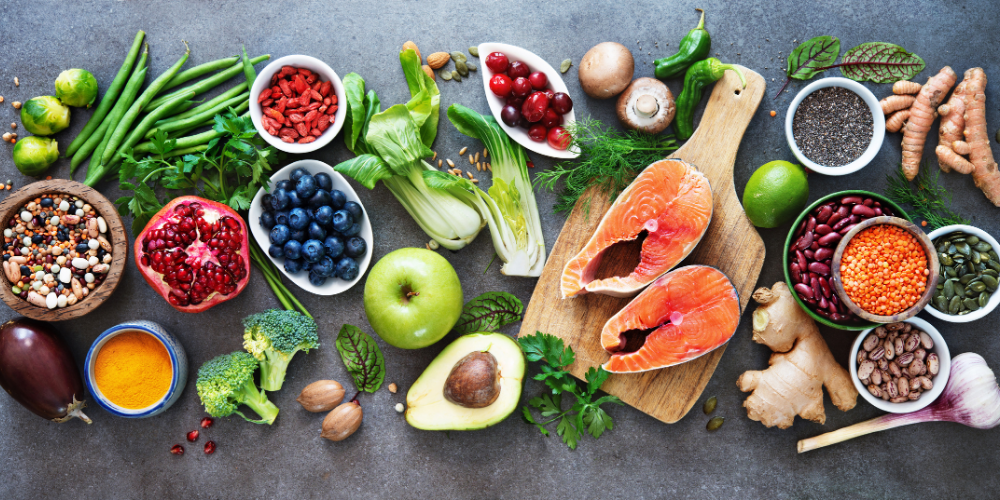The British Nutrition Foundation hosts its ‘Healthy Eating Week’ this month which is dedicated to promoting good habits when it comes to feeding ourselves and our families.
I mention this NOT to suggest you go on a diet or make you feel bad about your family’s eating habits, but to use it as an opportunity to talk about food and nutrition.
We all know we should try and eat five pieces of fruit and vegetables a day and avoid foods high in sugar and fat, but why exactly and is there any more to it?
The Eatwell Guide is a great place to start, it divides the foods we eat and drink into five main food groups – fruit and veg, starchy carbohydrates, proteins, dairy and oils – in order to help us understand what foods will give us the right nutrition and vitamins to keep our bodies healthy and well fuelled.
Green goodness
Fruit and veg should make up more than a third of the food we eat each day – which, when you lay it out, is actually quite a lot! But there’s a reason for that, they’re a great source of vitamins and minerals to help your body work properly, and full of fibre, which can help maintain a healthy gut.
The good news is they are super easy to cook – you can buy them fresh, canned or frozen, and they are also low in fat and calories – unless you deep fry them or roast them in lots of oil of course. All you need to do is make sure you mix it up to ensure you are getting a variety of nutrients in your diet.
Of course, getting kids to eat their vegetables is easier said than done. Choose brightly coloured, sweet veggies such as sweetcorn, carrots and peas, and if you’re really struggling, try disguising the vegetables by grating them into a sauce. Other easy wins are making sure there are always sweet portions of fruit on offer such as an orange or blueberries, or making homemade pizza where they can choose which veggies they want to add.
‘Yes’ to carbs
We’ve heard of many ‘diets’ limiting the amount of carbohydrates we intake, but the truth is, they are also very good for us and again, should make up about a third of our day’s food intake.
Potatoes, pasta, rice and bread are a good source of energy and will make you feel fuller for longer so removing them from your diet completely could make you feel hungrier with less energy.
Of course, you can over-do it, so be careful not to eat more than is advised, and where possible opt for wholegrain or high fibre varieties such as brown rice.
Dairy queen
Dairy products – or alternatives such as soya if you are vegan or intolerant – are also an important part of your diet, particularly because they are fantastic sources of calcium which helps us keep our bones strong.
Not only is this important for kids as they grow, but also for adults as they age, strong bones make them less likely to break through falls, and will also help prevent you from losing strength as you get older.
Milk with your cereal, a daily yoghurt, or using cheese a couple of times a week should be enough. It’s important to be aware that dairy is a rich source of saturated fat, so again the key is not ‘elimination’ but ‘moderation’. And be aware, so-called low-fat options are not always healthier – many are actually higher in sugar than their full fat counterparts. So, keep an eye on the labels when choosing.
Protein power
Protein is essential for the body to grow and repair itself, and so an important part of a balanced diet.
Traditionally a stereotypical meal consisted of ‘meat and two veg’, but today we know that you can get your protein fix from a whole range of different foodstuffs, including pulses, beans, eggs, fish and lentils, so it’s an easy one to incorporate no matter what your personal requirements.
Around 15% percent of your daily intake should be protein, so enjoying a lentil curry, a lean cut of meat, beans on toast or a piece of fish a couple of times a week is going to be doing you good. Pulses such as beans, peas and lentils are particularly good because they are lower in fat and high in fibre.
Choose lean cuts of meat and mince, and eat less red and processed meat like bacon, ham and sausages where possible as these are higher in fat.
Oil be fine
Oil is an important part of the cooking process, whether it’s for frying or drizzling on salads.
The good news is small amount of fat derived from oil is good for you.
The fatty acids that you get will help the body absorb vitamins A, D and E, which help support the body’s functions.
Unfortunately, while it is good for you, it’s important to be aware of how little you need.
Choose unsaturated oils and spreads such as vegetable, rapeseed, olive and sunflower oils and limit use to a splash or two per meal.
The Eatwell Guide applies to most of us, no matter what our age or weight.
So, next time you’re wondering what to put on the table, think about what nutrients your body might need rather than what you fancy!

